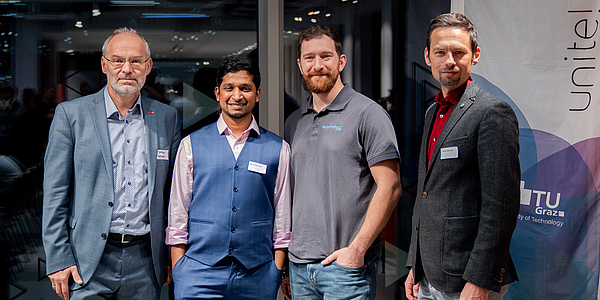News+Stories: Your job sounds like a lot of fun – evaluating food products must be rather enjoyable, isn’t it?
Erich Leitner: My staff and I are often told: “All you seem to do is eat and drink all day long.” But of course the truth is rather different. Sometimes it is a rather tough task because tasting is anything but pleasurable consumption. Take a quality test, for example. On a single day I may have to taste and objectively assess up to 250 fruit juice samples. Doing this takes a healthy dose of masochism. Also, the fun aspect is altogether negligible if you have to smell a long line of dashboards or leather seats one after the other, all day long. There are even test smokers who evaluate the taste of tobacco, although we don’t have any at our institute.
This is also part of your job description?
Erich Leitner: Exactly. I am the Head of the <link http: www.analytchem.tugraz.at analytchem_contao _blank int-link-external external link in new>Institute of Analytical Chemistry and Food Chemistry and also a member of the <link http: www.analytchem.tugraz.at analytchem_contao index.php food-chemistry _blank int-link-external external link in new>Food Chemistry and Human Sensory Analysis Working Group, which investigates organoleptically active molecules – primarily by smell and in any situation. Naturally this includes food, but also materials that are in contact with food such as packaging or cutlery, or of course also such things as the smells inside a car or subjectively unpleasant odours in the neighbourhood.
Smell is our oldest sense and very strongly associated with memories and emotions. We find it very difficult to describe a smell and almost always take refuge in comparisons. We would say “this smells like the apple pie my grandmother used to bake” or something similar. We remember smells for a very long time. In our working group we try to objectify this perception and train people, turning them into a test machine so that we are able to come up with quantitative statements.
What is it that fascinates you so much about this field?
Erich Leitner: When I was a student – now we are talking a long time ago – I once went to eat in the students’ canteen. Now this was a near-death experience for me (laughs). To make sure this wouldn’t happen I took up cooking. But this in turn tickled my academic research instinct. Knowing how to make a particular dish tasty is not enough for me. I also want to know why it turns out tasting good or bad when I prepare it in a certain way. And eventually wine came into the picture, so I took it step by step.
Originally I studied technical chemistry, but I soon also acquired a taste for analytical chemistry as it were. When the first chair for “food chemistry” was filled I joined the Institute as an assistant. From then on, my interest in this subject grew constantly.
In the 30 years I have been working in Graz so far I built a large and interesting network with wonderful food production companies. This year the institute organised a <link http: www.analytchem.tugraz.at summerschool _blank int-link-external external link in new>summer school for the first time. I showed what quality means in the context of food products and how much this understanding is influenced by culture.
Do you have any tips for people who are very conscious of the quality of their food?
Erich Leitner: For me it is very important to show respect for food. I also try to embrace regionality and seasonality. This works surprisingly well – I can source top products of excellent quality nearby (for me this has nothing to do with national borders). I deliberately buy a lot from the farmer’s market, not least because I want the producers to feel that I appreciate the hard work they put in every day to make sure we can get fresh products in the city. The number of people out there who really care about this is steadily growing. For example, we currently have more than 20 different varieties of tomatoes again – clearly, something is happening!
Some say that food products are terribly expensive. But this is not true. Only a few years ago we used to spend an average of 40% of our income on food – today it is only 12%, and in the USA little over 6%. Especially when I buy meat I also consider the ethical aspect and try to choose prudently. It is good practice to stop and ask yourself at times whether the slaughtering conditions in many cheap farming enterprises are really acceptable.
Is it important to you that products are “biologically farmed”?
Erich Leitner: Not necessarily. I believe that this selling point can be open to much abuse. What counts most in my opinion are smell and taste, and of course also the regional origin.
Another important point is knowing that the products have been prepared properly. The older I get and the more I cook, the simpler my cooking becomes and the more I turn into a nose-to-tail eater, meaning that I use everything and throw away little.
Have you ever considered trying your hand at the catering trade?
Erich Leitner: My wife even passed the license examination, but catering is a cutthroat trade that knows no mercy. We wouldn’t choose to go into it voluntarily (laughs). A hobby should remain just that – even if, strictly speaking, I regard my job as my hobby as well because it is so interesting and because I like it so much.
Erich LEITNER
Ao.Univ.-Prof. Dipl.-Ing. Dr.techn.
Institute of Analytical Chemistry and Food Chemistry
Stremayrgasse 9/II
8010 Graz
Phone: +43 316 873 32503
<link int-link-mail window for sending>erich.leitner@tugraz.at





